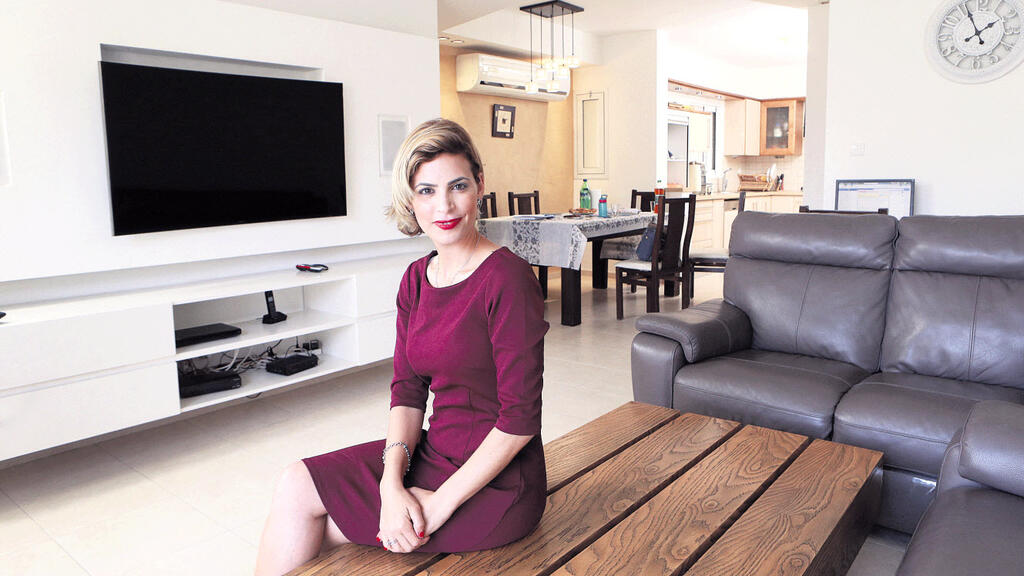Getting your Trinity Audio player ready...
Just over four years ago, Ofira Aviram experienced what she defines as a "life-changing shock," which turned her into a bitter, disillusioned and primarily hopeless woman. Ofira, a 40-year-old married mother of two who works as a numerologist, suddenly experienced a decline in her hearing. Concurrently, she developed tinnitus, a phenomenon in which one starts hearing ringing, buzzing and noises that do not actually exist.
More Stories:
"It happened out of nowhere," she recounts. "Until that day, I was in shape and in good health, taking long walks on a daily basis, working long hours in numerology, and meeting many clients. And from this blessed routine, when I was at my peak in every sense, with an active and fulfilling daily schedule, I fell into a pit, no less."
2 View gallery


Ofira Aviram says she developed tinnitus, a phenomenon in which one hears ringing, buzzing, and non-existent noises 'out of nowhere'
Since the problem began during the winter, she naturally assumed that her ear symptoms were related to the cold weather. However, as the days passed, the constant ringing persisted and she embarked on a frustrating journey to find answers that lasted no less than four years. Throughout this period, she visited numerous doctors, but none could diagnose the reason for her tinnitus.
"Each of the doctors who examined me – and there were quite a few – asked me to precisely describe how I felt. I replied that it felt as if a relentless orchestra of crickets had taken up residence in my ears 24/7," she says.
If that wasn't enough, her hearing deteriorated. "I started experiencing things that I couldn't even imagine before," she describes. "I realized that I could barely hear, so I asked my children and my husband to speak to me loudly. If someone called to me on the street when I had my back turned, I didn't hear them. Only in hindsight did I find out that people were asking: What happened to Ofira? Did she lose her mind? Is she too rude to answer? She doesn't even turn her head anymore."
In addition to the weakening of her hearing in both ears, Ofira stopped meeting clients face-to-face. "Sitting in front of someone and having to ask 'What? What?' every second was frustrating and embarrassing," she admits. In order to sustain her livelihood, she communicated solely through the telephone.
"And if the days were difficult, the nights were a nightmare," Ofira says.
"Everything was silent, no distractions whether I wanted them or not, and all I could hear continuously was the orchestra of crickets from the tinnitus, driving me crazy. I couldn't sleep for entire nights. I banged my head against the walls. It made me short-tempered and diminished the quality of my life. Our home is bustling with life, children coming and going, and I feel that the tinnitus and the noise overpower my ability to cope. The result was that I argued with the children and my husband, and they suffered with me because I took out all my frustration on them," she says.
2 View gallery


Since surgery to correct her otosclerosis, Ofira Aviram has been able to relax
(Photo: Zvika Tishler)
During those four years, Ofira was sent to hospital emergency rooms more than once.
"In my last visit, the doctor was straightforward," she recounts. "He told me, 'Enough, start accepting the condition, and instead of running between doctors who will tell you the same thing, make an appointment with a communication specialist to fit hearing aids.' I was furious with him, but I wanted my old life back so badly that I no longer cared about appearances. I hoped that the nightmare would end and that, at long last, I would be able to hear."
The mechanical solution indeed helped the hearing to some extent, but at the same time, it also increased the intensity of the tinnitus. Ofira was already desperate when a client, who happened to be a doctor, recommended that she undergo a CT scan and bring the results to the audiology department at Tel Aviv Sourasky Medical Center – Ichilov Hospital. There, she was diagnosed with otosclerosis, a condition that affects the structure of the inner ear's bony envelope.
Approximately 19% of the population suffers from this condition to some degree, and it is more common among women age 30 and above.
"I arrived at the audiology institute in Ichilov with the interpretation of the imaging, and there they already gave a name and definition to my problem," she says. "They recommended surgery and without hesitation, I agreed to it."
Dr. Rani Abu Ita, director of the endoscopic ear surgery unit at Ichilov and the one who operated on Ofira, explains that "otosclerosis is caused by the fixation of the stapes bone, which is the smallest bone in the human body and is no longer functional. The first stage of the surgery involves a forward scan of the ear canal. Then, using tiny surgical instruments, we break the fused bone, remove its parts, and implant a small titanium prosthesis in its place. We secure the prosthesis in place with self-dissolving gel, and when it completely dissolves hearing is fully restored." According to the doctor, the surgery is performed at major medical centers in Israel.
"I felt like I was resurrected," says Ofira. "How sweet it is for me to hear the chirping of birds, and what a joy it is that I can shout at my children, 'Speak quietly, why are you yelling?'"

